,'4'鎸栨帢鏈哄効姝岃棰戜腑鏂囨瓕鏂伴椈鏂伴椈(,')
* Greener and smarter vehicles have become a main force of China's exported vehicles in the global auto market.
* Chinese auto products have grown increasingly competitive with improvements not only in appearance, quality, safety, intelligence, environmental friendliness and driving experience, but also in cost-effectiveness and brand awareness, appealing to a wider crowd of global customers.
* Insiders believe the whole world will benefit from the deeper integration of Chinese auto companies into the global supply chain, creating a win-win scenario.
BEIJING, Feb. 18 (Xinhua) -- Almost one year since Israel Aguilar tried out a Chinese new energy vehicle (NEV), the Mexican believes he may not get back to driving his petrol car anymore.
The NEV, now his favorite, features great comfort and reliability. "Technology is truly very important in these times, especially for a vehicle. And it has been truly extraordinary for me to handle these technologies that come from China," said Aguilar.
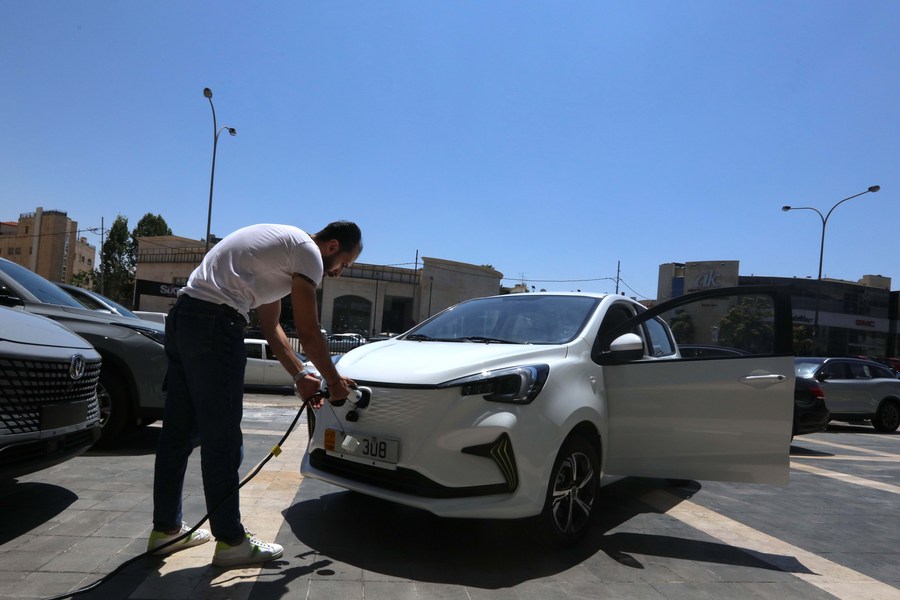
A sales manager charges an electric vehicle made by Chinese automaker Changan at a car dealer in Amman, Jordan, on Aug. 15, 2022. (Photo by Mohammad Abu Ghosh/Xinhua)
Last year, China's auto exports reached 3.11 million units, up 54.4 percent year-on-year, according to the China Association of Automobile Manufacturers (CAAM). NEVs comprised an important pillar of China's auto industry in 2022, with its export volume reaching 679,000 units, an increase of 1.2 times year-on-year.
In a highly competitive global market, China's auto industry, marked by a resilient supply chain, a commitment to green development and a win-win pursuit, stood out against the headwind of the COVID-19 pandemic and a sagging world economy.
STABLE PRODUCTION, RESILIENT INDUSTRY
Masks on, workers are busy with car assembly and testing in disinfected units, expecting more cars to go off the production line and enter the market.
This has become a daily routine of Chinese auto plants over the past year. From the production and supply of auto parts to the distribution of complete vehicles, all links of the auto industrial chain have been operating as normal.
China's effective epidemic prevention measures and the later optimized preventional measures have secured a resilient auto industrial chain, a precondition for the stable supply of Chinese cars and their growing popularity in the global market.
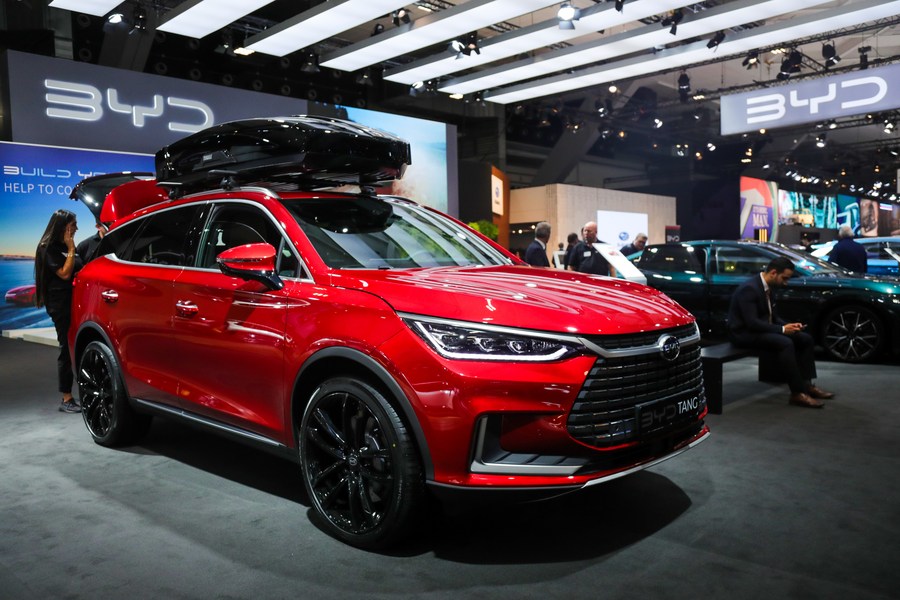
People experience a BYD Tang electric car during a media preview of the 100th Brussels Motor Show in Brussels, Belgium, Jan. 13, 2023. (Xinhua/Zheng Huansong)
Meanwhile, many foreign auto manufacturers had to suspend production due to repeated COVID-19 outbreaks and tight supply chains, leading to a shortage of cars in the overseas market. Luckily, China's expanding auto exports offered a way out.
Bai Ming, a researcher at the Chinese Academy of International Trade and Economic Cooperation, said that global automakers are under pressure from rising raw material prices. In this context, Chinese-made NEVs play an increasingly important role in the global NEV industry chain by taking advantage of a strong domestic industrial and supply chain and an advanced intelligent connected vehicle (ICV) technology, thus becoming a new fulcrum to stimulate China's foreign trade growth.
Jochen Goller, president and CEO of BMW China, expressed his confidence in the strength and resilience of China's supply chain at the China NEV Development High-Level Forum 2022.
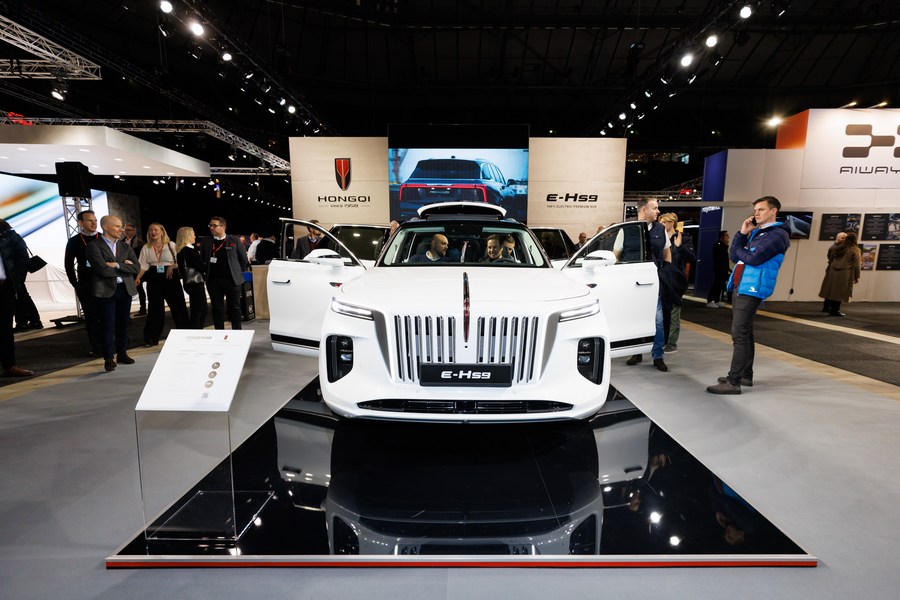
People look at a Hongqi electric vehicle at the Swedish eCarExpo 2023 in Stockholm, Sweden, on Feb. 3, 2023. (Photo by Wei Xuechao/Xinhua)
INNOVATION FOR GREENER, SMARTER AUTOMOBILES
Chinese carmakers have become increasingly focused on automobile electrification and intelligence implementation, which helps Chinese cars gain a foothold in this field amid a global consensus for green development.
The China Changan Automobile Group, committed to promoting smart NEVs in recent years, has invested "no less than 5 percent of its annual sales revenue in research and development, and has mastered more than 600 intelligent low-carbon technologies regarding intelligent connectivity and smart driving," said a representative of the group.
Chinese NEVs uphold the prevailing concept of green and low-carbon development, and have registered steady sales growth due to a relatively high price-performance ratio. They also provide human-computer interactions during the driving process, which enables customers to enjoy the convenience brought by AI.
Greener and smarter vehicles have become a main force of China's exported vehicles in the global auto market. In the European market, Chinese brands, such as BYD and Hongqi, have entered the top 50 best-selling motor companies list across Europe, The Times reported.
Shu Youxing, general manager of BYD International Cooperation Division and the European Automobile Sales Division, said that the company's pure electric buses have now hit the roads of more than 100 major European cities such as Amsterdam, London, Madrid, Turin, Oslo and Copenhagen, helping Europeans cut carbon emissions by over 200,000 tons.
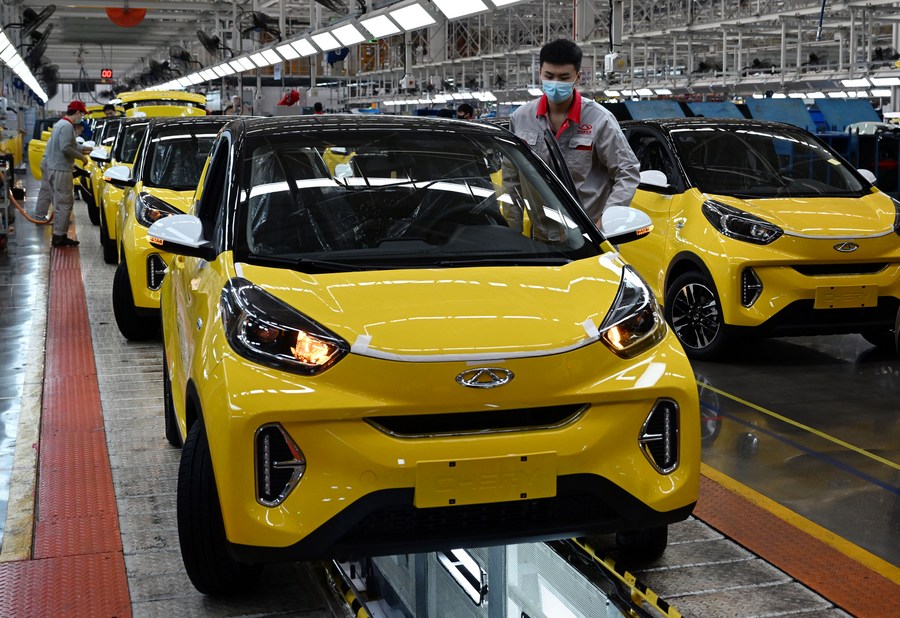
Workers are busy on the production line of new energy vehicles (NEVs) at a factory of Chinese automaker Chery Holding Group Co., Ltd. in Wuhu City, east China's Anhui Province, Oct. 12, 2022. (Xinhua/Zhou Mu)
WORLDWIDE RECOGNITION, GLOBAL BOON
Chinese auto products have grown increasingly competitive with improvements not only in appearance, quality, safety, intelligence, environmental friendliness and driving experience, but also in cost-effectiveness and brand awareness, appealing to a wider crowd of global customers.
This worldwide recognition is also closely related to the localization of Chinese auto enterprises in the overseas market. Yin Tongyue, chairman of Chery Automobile Corporation, emphasized the manufacturer's principle that Chery should "promote its localization, turning itself into a local corporate citizen and a local brand so as to contribute to the socio-economic development of countries where its overseas markets lie."
Insiders believe the whole world will benefit from the deeper integration of Chinese auto companies into the global supply chain, creating a win-win scenario.
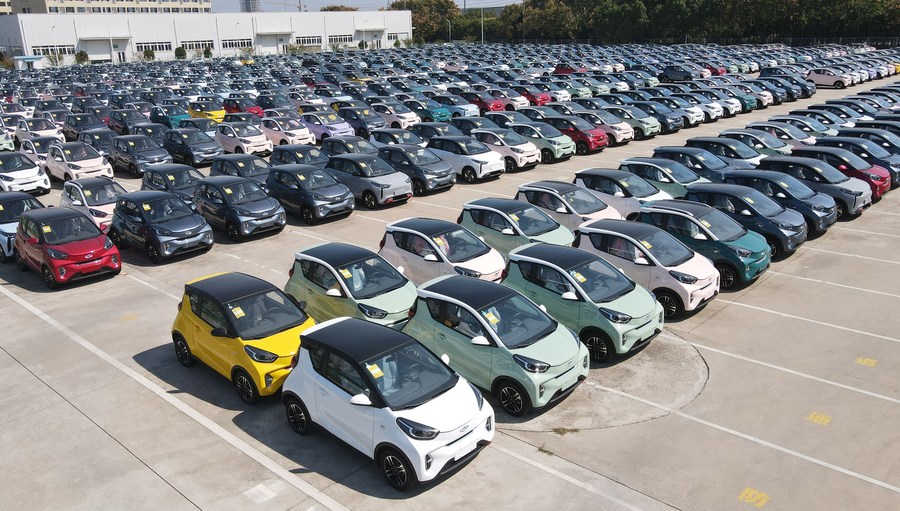
This aerial photo taken on Oct. 12, 2022 shows new energy vehicles (NEVs) at a factory of Chinese automaker Chery Holding Group Co., Ltd. in Wuhu City, east China's Anhui Province. (Xinhua/Zhou Mu)
China's globally hot-selling cars are witnessing the country's vigorous opening of the auto market, which pooled advanced international production factors and nurtured creative Chinese entrepreneurs.
"By working with Chinese new energy companies, we learn about advanced technologies in China, which helps to promote further exchanges between us," said Ferdinand Dudenhoeffer, director of the Germany-based CAR Center Automotive Research Duisburg, who noticed the rising presence of Chinese NEV companies in Europe with innovative technologies.
Such mutually beneficial cooperation will bring about the further expansion of China's auto export. Xu Haidong, deputy chief engineer of the CAAM, predicted that China's auto exports will enter a relatively rapid growth phase at 20 percent annually lasting at least five to 10 years.
(Video reporters: Meng Jing, Ji Ze, Yang Yunqi, Ding Ting, Zhou Rui, Cao Li, Ma Shurui, Wang Haiyue, Wang Xiaowei, Wang Pingping, He Lili, Hu Xiaobing; video editors: Hong Yan, Yin Le, Zhang Zhihuan, Liu Xiaorui)■
下一篇:|'m完整形式(|'m)
